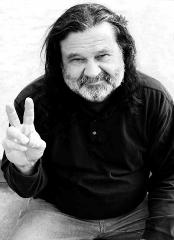

|
Christianity’s exclusive god |
|
Even though I’ve had denominational, evangelical and fundamentalist tendencies in the past—I now consider myself simply a follower of God in Christ and in his creation.
Why I’m not Denominational Denominations are sectarian meaning they favor and exalt their form of Christianity over others. In so doing, they develop a self-righteous and prideful demeanor, “we please and serve God’s purposes more than others. We are right others are wrong or at least not as right as we are!” Denominationalism is why the one Church of God is divided in so many odd shaped puzzle pieces that supposedly fit together. Denominations that give themselves too much self-importance transform into cults and make their members servants of elitism, disunity and darkness.
Why I’m not Evangelical Evangelicals prime goal is to save souls for a heaven that is dissociated from the earth. For evangelicals what is important is heaven not earth, we are here on earth with the sole mission of gathering souls for heaven, whether or not a person is “saved” is all that really matters. Such a view makes it easy to exploit and destroy mother earth. Furthermore most evangelicals have an “us verses them” mentality, we are the “saved” and everyone who does not share our urgency to save or be saved is worldly and lost. Because the saved have this simplistic world view and a sense of self-importance (God’s favorites on a mission) they tend to impose their experience and culture (Christianity) on others. Historically, evangelical missionaries who represent the most zealous evangelicals, have been responsible for helping destroy indigenous cultures by their efforts to evangelize the world. They have done this by joining forces with colonialist powers who want to civilize the earth in their image! Ironically the destruction of culture and the environment can be laid at the feet of those out to save the world! No, I’m not an evangelical. I’m not interested in “evangelizing” (destroying culture and the earth) but embracing and loving people until they start to realize the presence of God that has always been there! We want them to experience heaven on earth and live connected to all things in a respectful manner, here and now! Why I’m not a Fundamentalist Fundamentalism is interested in the spiritual-political control and conquest of the world. When it achieves these goals it makes its religious world view the law of the land and shows little tolerance for anyone who trespasses the status quo. A fundamentalist state is the worse form of totalitarianism because it believes that it is divinely ordained and pleasing to God, even as it executes those who trespass its laws. Christianity’s exclusive God Denominationalism, evangelicalism and fundamentalism are the problem, they do not offer hope but despair and division. The proof is in the fruit: Christianity is the most divided religion on the face of God’s earth, the opposite of what Jesus desires for his people (John 17:21) and the reason why multitudes stay away from organized religion. So what’s the problem? All three, denominationalism, evangelicalism and fundamentalism are based upon an exclusive view of God and his purposes. Even though they teach God wants to convert and include everyone, the emphasis is ultimately exclusive: All are invited but few measure up and are accepted in the final analysis. Why? The reason has to do with the image of God’s character as perceived by these religious groups. God’s image is rigid and demanding. To be accepted, one must believe rightly and live rightly as defined by God’s word. Those who don’t are excluded, hence most Churches based on their concept of God have an exclusive stance towards those outside their ranks. Here is the problem as I see it: God’s standard of correct doctrine and life-style is interpreted differently by each Christian sect and therefore the underlying conviction is God has his favorites, ie. The ones whose faith and deeds line up most truly to his word. In this scheme, right doctrine leads to right actions. However, if this is true then the only honest assessment is … because Christianity is so divided it must be based upon false doctrine. The false doctrine consists of the church using the word in a manner contrary to God’s intent or purpose. The purpose of God’s word is reflected in the nature of the Hebrew alphabet and writing which lacked vowels. Therefore “in order to be read, they had to be added to, enspirited by the reader’s breath … And there was no single, definitive meaning; the ambiguity entailed by the lack of written vowels ensured that diverse readings, diverse shades of meaning, were always possible … the absence of vowels lent a deeply interactive or interpretive character to the Jewish community’s understanding of its own sacred teachings” The spell of the Sensuous, David Abram, pgs. 242-243. A classic example of the interactive or interpretive character of the written Hebrew text is The Name of God: “With the Temple destroyed and the prohibition on pronouncing The Name outside of the Temple, pronunciation of the Name fell into disuse. Scholars passed down knowledge of the correct pronunciation of YHVH for many generations, but eventually the correct pronunciation was lost, and we no longer know it with any certainty. We do not know what vowels were used,” Tracey R Rich , Judaism 101, http://www.jewfaq.org/name.htm. “Torah called for a living and dynamic response … The Hebrew Bible is not a set of finished stories and unchanging laws; it is not a static body of dogmatic truths but a living enigma that must be questioned, grappled with, and interpreted afresh in every generation,” Ibid, p. 244. We must remember that one of the dominant polemics in St. Paul and therefore the NT is against the rigid use of the word, as law. Paul reminds his hearers over and over again that the “word,” is “Good News:” It is about a big hearted God who loves the world and includes it in Christ! The “words” intent is inclusion whereas the laws aim is exclusion-condemnation not the Good News that Jesus embodied! If God’s word was not meant to be the law of the land which determines whose in and whose out, then what is its purpose? Isn’t its main purpose to speak to man's heart and set him free to live as a child of God? Sadly however the word has become an instrument of bondage by being enshrined as the law of the land. This always leads to a static, legalistic and correspondingly exclusive view of God—but God is inclusive and his word is living and life-giving, it’s very nature is inclusive! God has included himself in every bit of his creation; every animal, bird, fish, plant, flower, tree, rock, river, star, water, breath, etc. He addresses us through all he has made as well as through every word of wisdom regardless of what tribe, Jewish or pagan it originates from. Every act of kindness is God’s kindness. Every loving sacrifice for the community is God’s sacrifice. God has included himself because he wants all nations, people, tribes and languages to reach out, find him and count themselves included, Acts 17. Therefore God’s word spoken to our hearts throughout creation and in the voices of many peoples all tell us we are included because God is an inclusive Creator. It is in hearing him speak words of belonging that we are set free! This freedom imparts eyes to see everyone/thing included. They are only excluded by the ignorance of not hearing God’s lullaby and staying away from God’s embrace! Much of Christianity therefore is bankrupt because it has become exclusive by not hearing the inclusive lullaby of its God. It’s experience is divisiveness which proves its understanding of the word (doctrine) is false, in the case of Christianity, right doctrine does not lead to right actions! The very foundation upon which Christianity is built is a wrong understanding of the words’ purpose. The word is not primarily a standard for right behavior (legalism) but a song or lullaby of belonging to God in Christ and in his creation. The lullaby speaks to our hearts and helps us embrace God’s heart which is at the heart of all things in heaven and earth. As we enter into this kingdom we find ourselves living in peace with all things because we realize their inclusiveness in God. I’m not denominational, evangelical or a fundamentalist because the God I serve in Christ Jesus and his creation is inclusive, while denominationalism, evangelicalism and fundamentalism represent a false understanding of God’s nature and his word. May the inclusiveness of God raise up to greet you in Christ and in his creation!
|
|
Personal reflections of Bill Redondo, Fresno, California |
|
May your past find deep healing in God’s present embrace and may your future flow out of that same embrace until all is well with your soul: Forever young, forever joyful, forever in love. |

|
Christ, Culture and the Sins of Christianity
|
